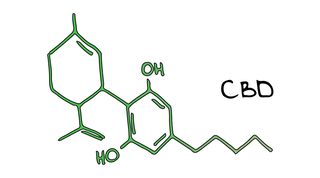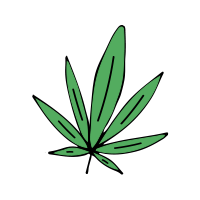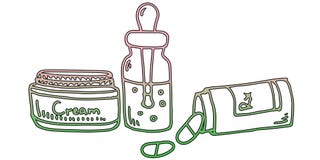Wait, Can CBD Legit Help With Anxiety?

It’s no surprise that cannabidiol, the non-psychoactive chemical compound otherwise known as CBD found in cannabis plants, is having a real moment in the health and wellness spotlight. After all, the list of purported benefits of CBD sounds nearly too good to be true.
.
Though scientific research on the effects of CBD remains scarce, growing anecdotal evidence shows it could help people with everything from generalized aches and pains to insomnia, and may even help cancer patients overcome chemo-related nausea. Perhaps one of the most widely recognized things CBD may help with, though, is anxiety.
According to a 2018 cross-sectional study of CBD users, “anxiety” ranks as one of the top three reasons for consuming the cannabis-derived product, along with “depression” and “pain.” Considering nearly 20 percent of the adult population in the United States reports suffering from some form of anxiety, CBD may come as welcome relief.
However, before you put anything in your body—for any reason—you should talk to your doctor and, of course, do your homework. To get started, here’s everything you need to know about CBD and if it really can help with anxiety.
Wait, what’s CBD again?
CBD is one of the more than 100 chemical compounds found in the cannabis plant, which produces both marijuana and industrial hemp. CBD is an extremely close chemical cousin of tetrahydrocannabinol, or THC. In fact, the two chemicals are separated by the arrangement of a single atom. However, there’s one major difference between the two: THC gets you high, while CBD cannot.
Getty Images
The CBD sold to consumers is a hemp-derived product, which legally cannot contain more than 0.3 percent THC. Translation: No matter how much you consume, you will not get high.
Got it. So how does CBD help with anxiety?
.
While research is still very preliminary, CBD is thought to ease anxiety by helping the body process serotonin, a hormone and neurotransmitter that plays a role in regulating emotions. The process by which this occurs is thought to be similar to that of serotonin reuptake inhibitors (SSRI), a class of anxiety and depression medications.
SSRIs target a serotonin receptor called 5-HT1A and increase the availability of serotonin in the brain to help boost your mood, explains James Murrough, MD, the director of the Mood and Anxiety Disorders Program at the Icahn School of Medicine at Mount Sinai.
Similarly, one 2019 study found that CBD enhanced 5-HT1A transmission in rats and reduced “anxiety-like behavior.” Now, it’s up to researchers to test this finding on humans too.
What other research has been done on CBD and anxiety?
While a lot of the support for the use of daily, low-dose CBD comes from anecdotal reports (people saying, “CBD has helped me manage my anxiety”), there are “strong hints in the medical literature that CBD does have anti-anxiety properties,” says Dr. Steve Patierno, chair of Curaleaf’s medical advisory board and the deputy director of the Duke Cancer Institute. [Editor’s Note: Curaleaf is medical and wellness cannabis operator with dispensaries, cultivation, and processing sites across the country.]
.
If you’re interested in a taking a peek at some of the studies, here are two worth digging into:
- This 2011 study looked at people with public speaking phobias and found evidence that CBD may reduce anxiety and negative “self-statements” like, “I’m no good a this.”
- This review analysis of 49 existing studies concluded that CBD could be an excellent way to combat anxiety, panic disorders, and perhaps post-traumatic stress disorder.
You can also check out some additional studies showing promise in CBD’s ability to help with anxiety here.
How should I go about using CBD for my anxiety?
First things first: CBD isn’t ideal for everyone, and it can interact with certain medications (like blood thinners and anti-seizure drugs). That said, no matter what your medical condition, it’s important to talk to your doctor before adding CBD to your routine, says Hampton Atkinson, MD, the co-director of the Center for Medical Cannabis Research at University of California San Diego.
Getty Images
Once you get the all-clear, consider trying a CBD tincture first. They have high bioavailability, meaning the body easily absorbs them. Never used a tincture or CBD product before? Here are a few things to keep in mind.
Try a tincture
Start by taking the dropper and placing the liquid under your tongue. (This is known as taking a supplement sublingually.) Let it sit for a few seconds, so it absorbs into your bloodstream before you swallow.
Figure out your ideal dose
This is a tricky one. There are no dosing guidelines for CBD, which means it’s one big guessing game. Because everybody is different, it’s up to you to play a little guess-and-check with dosing each day to see what works best for you.
Dr. Patierno suggests starting with a lower strength product and taking 1 milliliter dose in the evening, an hour before you go to sleep. (This works out, in many cases, to be a dropper-full, but def read the packaging to be certain.) Just make sure to stick with a CBD routine for several weeks since you may not feel its effects right away, if at all.
Okay, last thing: How can I find quality CBD products?
After you find a CBD product you’re interested in buying, see if the company that makes it shares the results of third-party independent testing on their goods, recommends Dr. Patierno. With the results, you should be able to see just how much CBD is in a product and be able to ensure that no other harmful chemicals are present.
.
Want to play it extra safe? Take it one step further by asking just where and how the company’s industrial hemp is grown, processed, and produced. It matters less on where it’s actually grown, and more shows just how transparent the CBD brand is willing to be.
And, as you know, knowledge is power, especially when it comes to putting things in your precious body.
Source: Read Full Article





